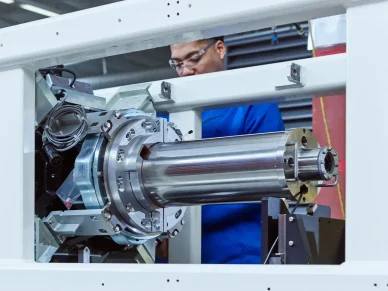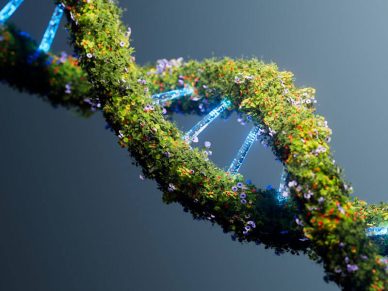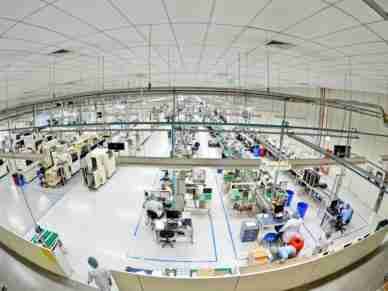View This Article in BOSS Magazine
Leveraging the brightest minds in engineering and chemistry has vaulted Downhole Chemical Solutions to lead a highly specific slice of the energy industry
Co-founded in 2015 by Wayne Cutrer, Downhole Chemical Solutions (DCS) is the premier provider of dry polymer services to the oil and gas space. The firm employs about 140 people who serve fracing operations in New Mexico, Texas, Louisiana, and Oklahoma.
Unlike most oilfield service companies in the chemical space, DCS is 100% focused on the development and refinement of slickwater fluid systems, a delivery method in which chemicals are added to water to decrease friction pressure and assist proppant delivery in hydraulic fracturing (fracing) operations.
Used in roughly 80% of the world’s fracing sites, slickwater fluid systems are primarily based on polymer friction reducing (FR) chemistry. In laypersons’ terms, the polymer mixes with water to produce the “slickwater” fluid. In traditional liquid emulsion FRs, the active polymer is the only content that is useful to the actual fracing; the emulsion combination of oil and water is strictly a carrier fluid that provides no benefit to the operation. Only about 20-30% of the fluid content is active polymer.
In the U.S., liquid FRs are transported via truck or rail to the different basins. That means moving a substance made with 70 or 80% inactive ingredients from one place to another. “Just to stick it back into the earth,” Cutrer said. “It offers zero performance or operational value.”
That disparity was recognized back in 2010, and several large multinational polymer and oilfield service companies quickly sought to create ways to administer a 100% active dry polymer at the fracture site. “In theory this made sense,” he explained. “You bring 100% active material out, reducing logistics, road hours, and all the ESG benefits that could come with that.”
In practice, however, significant complexities slowed the development of a dry friction reducer delivery system that actually worked. Dry material proved to be very difficult to handle and administer at the job site without causing issues such as mechanical equipment failures.
In 2018, Cutrer focused the company’s R&D efforts on perfecting the delivery of dry friction reducers. “It was a tall task given that companies much larger than us had marginal success with it,” he said. The essential question for the DCS team was how to derive more value out of an essential commodity: liquid FRs. “That was our goal.”
In a move uncommon in much of the industry, DCS hired engineers just out of college to apply fresh thinking to the conundrum. “We offered guidance from an oil and gas perspective, but we didn't put them inside a box,” he said. Armed with the deliverables they required, the young team had the company’s full support to create pioneering solutions to a problem that even deep-pocketed bigs were unable to conquer.
In 2019, the team introduced technology that made a step change in how FRs are used in fracing: the cutting-edge DriFlowTM system. “With the development and the commercialization of DriFlow, we not only took a commodity and turned it into something we could build a company around, but in turn provided our clients with a lower cost alternative, providing as good or better performance than the liquid FRs they had traditionally been using,” Cutrer said.
The result is the most advanced completion chemical delivery system in the industry. From autonomous operation to real-time water measurement, to remote monitoring of 50-plus data points in real time, the patented system is proof that performance and cost savings can co-exist. “It's easy to quantify cost savings and to quantify a performance increase when you can see a pressure differential during a job,” Cutrer explained.
At last, DCS is enabling energy providers to get the ESG benefits promised by the technology. The use of dry material drastically reduces road traffic, minimizing the potential for transportation-related accidents while slimming their carbon footprint. “For every one load of dry polymer that DCS brings to location, it takes three or four loads of liquid to do the same job. We've taken that out of the equation,” he said. DriFlow systems reduce chemical-related last-mile CO2 emissions by 73% and cuts the number of last mile trips to job sites by 76%.
Today DCS operates 20 DriFlow units across the Haynesville, Eagle Ford, and Permian basins. The latest Gen3.X DriFlow units have been built with electronic fleets in mind, with a fully electric plug-and-play design that can be easily integrated with electric fleet power generation units.
“We continue to advance and innovate, whether it's in big steps like DriFlow was or in smaller steps as continually optimizing internal processes and systems,” he said. DCS utilizes a number of platforms for data acquisition, predictive analysis, and other digital forward moves.
All their material is produced in the U.S.; having a secure supply source insulates DCS from global supply chain disturbances. “We've been able to leverage that volume and buying power to form very mutually beneficial strategic supply arrangements with large multinational companies,” he noted.
That drive to innovate can be seen in the way they attract the talent needed to bring game-changing ideas to fruition. “We go into any hire with 100% transparency and 100% trust, from everybody at a field level or hourly facility employee all the way up to our executive team,” Cutrer revealed.
The DCS culture is its people. “We work to ensure that every hire adds to our culture and doesn't detract from it,” Cutrer concluded. “Our culture is the 140 people that wear our logo every day. And if those people are walking around with a smile on their face, if they're enthusiastic on the job site or in front of clients, if they're good moms, dads, brothers, sisters at home, that's our culture. That's really what separates us from anybody else I know.”
DCS was founded on two very simple principles, delivering efficiency and value to the oil and gas chemical sector. Today's market conditions require E&P companies to work continuously on improving well economics and performance. With a major emphasis on stimulation programs, a significant amount of a well's total D&C costs is associated with chemicals. DCS employs an innovative business approach, designed to disrupt the traditional chemical supply chain model and deliver value and efficiency.
DCS Focus:
Disruptive Chemistries - innovative products designed to replace traditional "commodity" chemicals and provide both better performance and lower costs.
Molecule to Application - bridging the gap between molecular chemistry knowledge and downhole chemical application knowhow.
Supply Chain Efficiency - eliminating the inefficiencies and added costs associated with the traditional oil and gas chemical supply chain model.
The DCS advantage is clear. Cost Reduction and Well Enhancement … quantitative results that deliver to your bottom line!
Corporate Office
One Cowboys Way #572
Frisco, TX 75034
Phone Number: 469.466.1100
Homepage Link: https://www.stimchems.com/
LinkedIn: https://www.linkedin.com/company/downhole-chemical-solutions



















